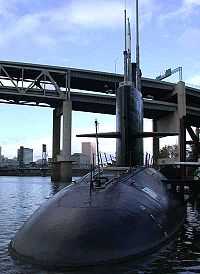Barbel-class submarine
 USS Blueback (SS-581) in Portland, Oregon | |
| Class overview | |
|---|---|
| Builders: |
Portsmouth Naval Shipyard, Kittery, Maine Ingalls Shipbuilding, Pascagoula, Mississippi New York Shipbuilding, Camden, New Jersey |
| Preceded by: | Skate-class attack submarine |
| Succeeded by: | Skipjack-class fast attack submarine |
| Built: | 1956 – 1959 |
| In commission: | 1959 – 1990 |
| Completed: | 3 |
| Retired: | 3 |
| Preserved: | 1 |
| General characteristics | |
| Type: | Fast Attack Submarine |
| Displacement: |
1,750 tons (1,778 t) light[1] 2,146 tons (2,180 t) full 2,637 tons (2,679 t) submerged[1] 402 tons (408 t) dead |
| Length: | 219 ft 6 in (66.90 m) overall[1] |
| Beam: | 29 ft (8.8 m)[1] |
| Draft: | 25 ft (7.6 m) max[1] |
| Propulsion: |
Fairbanks-Morse diesel engines, total 9,450 bhp (7.05 MW) 2 × General Electric electric motors, total 4,800 bhp (3.6 MW) one screw[1] |
| Speed: |
12 knots (22 km/h) surfaced 25 knots (46 km/h) submerged[1] |
| Endurance: |
90 minutes at full speed 102 hours at 3 knots (5.6 km/h) |
| Test depth: |
712 ft (217 m) operating 1,050 ft (320 m) collapse |
| Complement: | 8 officers, 69 men |
| Armament: | 6 × 21 in (533 mm)[1] bow torpedo tubes, 18 torpedoes |
The Barbel class of submarines, the last diesel-electric propelled attack submarines built by the United States Navy, incorporated numerous, radical engineering improvements over previous classes. They were the first production warships built with the teardrop-shape hull first tested on Albacore (SS-569), and the first to use an "attack center" within the hull rather than a conning tower in the sail. This class of submarine became part of the United States Navy's fleet in 1958 and was taken out of service between 1988 and 1990, leaving the Navy with an entirely nuclear-powered submarine fleet.
The Barbel class' design is considered to be very effective.[2] The Zwaardvis class submarine of the Netherlands and the Hai Lung class submarine of the Republic of China (built and sold by the Netherlands) were based on the Barbel class design.
General characteristics
- Displacement: 1,745 tons light, 2,316 tons full, 2,644 tons submerged
- Length: 66.47 m (218 ft 1 in)
- Beam: 8.84 m (29 ft)
- Draft: 8.92 m (29 ft 3 in)
- Armament: six 21 inch (533 mm) torpedo tubes (bow), with 18 reload torpedoes
- Propulsion: three Fairbanks-Morse 38d(8 1/8)×10 3150 shp (2.3 MW) diesel engines, two General Electric motors, totaling 4800 shp (3.6 MW)
- Speed: 15 knots (28 km/h) surfaced, 12 knots (22 km/h) snorkeling, 25.1 knots (46.5 km/h) on battery for 90 minutes
- Endurance: 1.5 hours at full speed, 102.0 hours at 3 knots (6 km/h)
- Range: 19,000 miles (31,000 km) without refueling
- Depth: 712 ft (217 m)
- Complement: 85 officers and men
Boats
Notes
- ↑ 1.0 1.1 1.2 1.3 1.4 1.5 1.6 1.7 Bauer, K. Jack; Roberts, Stephen S. (1991), Register of Ships of the U.S. Navy, 1775-1990: Major Combatants, Westport, CT: Greenwood Press, ISBN 0-313-26202-0
- ↑ Polmar, Norman (2004). Cold War Submarines: The Design and Construction of U.S. and Soviet Submarines, 1945-2001. Dulles: Brassey's. ISBN 978-1-57488-594-1, p. 215
References
- Friedman, Norman (1994). U.S. Submarines since 1945. Annapolis, Naval Institute Press. ISBN 978-1-55750-260-5.
- Polmar, Norman (2004). Cold War Submarines: The Design and Construction of U.S. and Soviet Submarines, 1945-2001. Dulles: Brassey's. ISBN 978-1-57488-594-1.
External links
- Barbel class at globalsecurity.org
- Oregon Museum of Science and Industry (OMSI) page on the USS Blueback
| ||||||||||||||